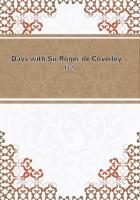Godfrey and his wife never went to Cornwall after all, for on Christmas Day the weather turned so bad and travelling was so difficult that they determined to stop where they were for a few days.
As for them the roof of this London hotel had become synonymous with that of the crystal dome of heaven, this did not matter in the least.
There they sat in their hideous, over-gilded, private sitting-room, or, when the weather was clear enough, went for walks in the Park, and once to the South Kensington Museum, where they enjoyed themselves very thoroughly.
It was on the fourth morning after their marriage that the blow fell.
Godfrey had waked early, and lay watching his wife at his side. The grey light from the uncurtained window, which they had opened to air the over-heated room, revealed her in outline but not in detail and made her fine face mysterious, framed as it was in her yellow hair. He watched it with a kind of rapture, till at length she sighed and stirred, then began to murmur in her sleep.
"My darling," she whispered, "oh! my darling, how have I lived without you? Well, that is over, since alive or dead we can never be parted more, not really--not really!"
Then she opened her grey eyes and stretched out her arms to receive him, and he was glad, for he seemed to be listening to that which he was not meant to hear.
A little later there came a knocking at the door, and a page boy's squeaky voice without said:
"Telegram for you, Sir."
Godfrey called to him to put it down, but Isobel turned pale and shivered.
"What can it be?" she said, clasping him. "No one knows our address."
"Oh, yes, they do," he answered. "You forget you telephoned to the Hall yesterday afternoon about the hospital business you had forgotten and gave our number, which would be quite enough."
"So I did, like a fool," she exclaimed, looking as though she were going to cry.
"Don't be frightened, dear," he said. "I dare say it is nothing. You see we have no one to lose."
"No, no, I feel sure it is a great deal and--we have each other. Read it quickly and get the thing over."
So he rose and fetched the yellow envelope which reposed upon Isobel's boots outside the door. A glance showed him that it was marked "official," and then his heart, too, began to sink. Returning to the bed, he switched on the electric light and opened the envelope.
"There's enough of it," he said, drawing out three closely written sheets.
"Read, read it!" answered Isobel.
So he read. It was indeed a very long telegram, one of such as are commonly sent at the expense of the country, and it came from the War Office. The gist of it was that attempts had been made to communicate with him at an address he had given in Cornwall, but the messages had been returned, and finally inquiry at Hawk's Hall had given a clue. He was directed to report himself "early to-morrow" (the telegram had been sent off on the previous night) to take up an appointment which would be explained to him. There was, it added, no time to lose, as the ship was due to sail within twenty-four hours.
"There!" said Isobel, "I knew it was something of the sort. This," she added with a flash of inspiration, "is the result of the meddling of that old General Cubitte. You see it must be a distant appointment, or they would not talk about the ship being due to sail."
"I dare say," he answered as cheerfully as he could. "Such things are to be expected in these times, are they not?"
"Too bad!" she went on, "at any rate they might have let you have your leave."
Then they rose because they must and made pretence to eat some breakfast, after which they departed in one of Isobel's motors, which had been summoned by telephone from her London house, to the Department indicated in the telegram.
They need not have hurried, since the important person whom Godfrey must see did not arrive for a full hour, during all which time Isobel sat waiting in the motor. However, when he appeared he was very gracious.
"Oh! yes," he said, "you are Major Knight, and we have a mutual friend in old General Cubitte. In fact it was he who put an idea into our heads, for which, as I understand you are just married--a pretty hunt you gave us, by the way--perhaps you won't altogether bless him, since otherwise, as you are only just recovered from your wounds, I have no doubt we could have given you a month or two extra leave. However, I know you are very keen, for I've looked up your record, and private affairs must give way, mustn't they? Also, as it happens, Mrs. Knight need not be anxious, as we are not going to send you into any particular danger; I dare say you won't see a shot fired.
"Look here, Major, you have been a Staff officer, haven't you, and it is reported of you that you always got on extremely well with natives, and especially in some semi-political billets which you have held when you had to negotiate with their chiefs. Well, to cut it short, a man of the kind is wanted in East Africa, coming out direct from home with military authority. He will have to keep in touch with the big chiefs in our own territory and arrange for them to supply men for working or fighting, etc., and if possible, open negotiations with those in German territory and win them over to us. Further, as you know, there are an enormous number of Indians settled in East Africa, with whom you would be particularly qualified to deal. We should look to you to make the most of these in any way required. You see, the appointment is a special one, and if the work be well done, as I have no doubt it will be, I am almost sure," he added significantly, "that the results to the officer concerned will be special also.















